China's agriculture sector sees rapid growth over past 70 years
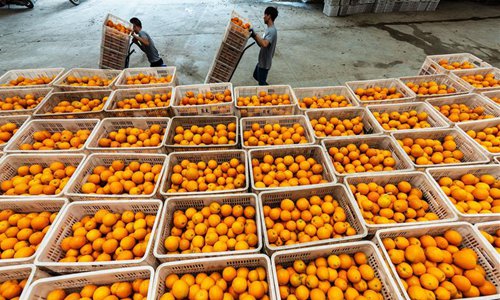
Workers carry fresh navel oranges at Wangjialing Village of Guojiaba Township in Zigui County of Yichang, central China's Hubei Province, April 6, 2019. China's agriculture sector has seen rapid growth over the past 70 years, with grain output expanding 4.8 times, according to a report from the National Bureau of Statistics (NBS). China's grain output grew at an average annual rate of 2.6 percent from 1949 to reach 658 billion kg in 2018, managing to feed around 20 percent of the world's population with only less than 9 percent of the world's arable land, according to the report. The country increased the diversity of food supply by developing the breeding industry, with the output of aquatic products ranking first in the world since 1989, which stood at 64.6 million tonnes in 2018, 143 times higher than 1949. The structure of the agriculture industry was continuously optimized, with a modern pattern promoting all-round development of farming, forestry, animal husbandry and fishery replacing the traditional farming pattern, the NBS said. Scale operation of agriculture was enhanced by the progress of rural land circulation. Over 35 million hectares of family contracted farmland was circulated in 2018, posing a sharp contrast to the 58 million mu in 2004. The country also fostered new types of entities of agricultural production and service. By the end of 2018, 600, 000 family farms and 2.17 million farmer cooperatives had been registered. (Xinhua/Zheng Jiayu)
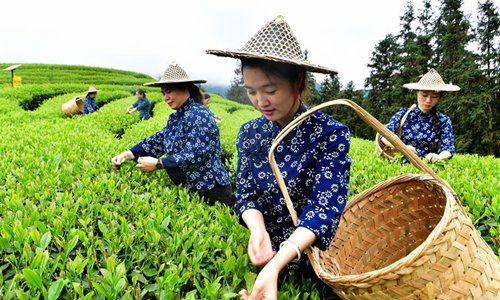
Tea farmers pick tea leaves at an ecological tea garden at Chaoyang Village of Xingcun Township in Wuyishan, southeast China's Fujian Province, April 14, 2019. China's agriculture sector has seen rapid growth over the past 70 years, with grain output expanding 4.8 times, according to a report from the National Bureau of Statistics (NBS). China's grain output grew at an average annual rate of 2.6 percent from 1949 to reach 658 billion kg in 2018, managing to feed around 20 percent of the world's population with only less than 9 percent of the world's arable land, according to the report. The country increased the diversity of food supply by developing the breeding industry, with the output of aquatic products ranking first in the world since 1989, which stood at 64.6 million tonnes in 2018, 143 times higher than 1949. The structure of the agriculture industry was continuously optimized, with a modern pattern promoting all-round development of farming, forestry, animal husbandry and fishery replacing the traditional farming pattern, the NBS said. Scale operation of agriculture was enhanced by the progress of rural land circulation. Over 35 million hectares of family contracted farmland was circulated in 2018, posing a sharp contrast to the 58 million mu in 2004. The country also fostered new types of entities of agricultural production and service. By the end of 2018, 600, 000 family farms and 2.17 million farmer cooperatives had been registered. (Xinhua/Wei Peiquan)
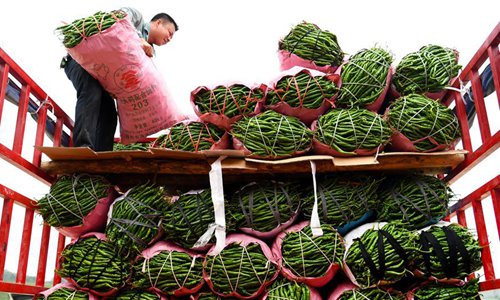
A man carries packed peppers at Niqiao Village of Luorong Town in Liuzhou, south China's Guangxi Zhuang Autonomous Region, May 20, 2019. China's agriculture sector has seen rapid growth over the past 70 years, with grain output expanding 4.8 times, according to a report from the National Bureau of Statistics (NBS). China's grain output grew at an average annual rate of 2.6 percent from 1949 to reach 658 billion kg in 2018, managing to feed around 20 percent of the world's population with only less than 9 percent of the world's arable land, according to the report. The country increased the diversity of food supply by developing the breeding industry, with the output of aquatic products ranking first in the world since 1989, which stood at 64.6 million tonnes in 2018, 143 times higher than 1949. The structure of the agriculture industry was continuously optimized, with a modern pattern promoting all-round development of farming, forestry, animal husbandry and fishery replacing the traditional farming pattern, the NBS said. Scale operation of agriculture was enhanced by the progress of rural land circulation. Over 35 million hectares of family contracted farmland was circulated in 2018, posing a sharp contrast to the 58 million mu in 2004. The country also fostered new types of entities of agricultural production and service. By the end of 2018, 600, 000 family farms and 2.17 million farmer cooperatives had been registered. (Xinhua/Li Hanchi)
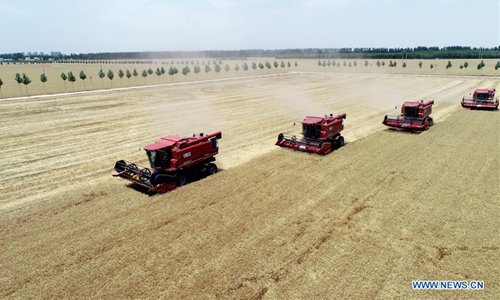
Reapers work at the wheat field in Yanli Village of Nanhe County, north China's Hebei Province, June 10, 2019. China's agriculture sector has seen rapid growth over the past 70 years, with grain output expanding 4.8 times, according to a report from the National Bureau of Statistics (NBS). China's grain output grew at an average annual rate of 2.6 percent from 1949 to reach 658 billion kg in 2018, managing to feed around 20 percent of the world's population with only less than 9 percent of the world's arable land, according to the report. The country increased the diversity of food supply by developing the breeding industry, with the output of aquatic products ranking first in the world since 1989, which stood at 64.6 million tonnes in 2018, 143 times higher than 1949. The structure of the agriculture industry was continuously optimized, with a modern pattern promoting all-round development of farming, forestry, animal husbandry and fishery replacing the traditional farming pattern, the NBS said. Scale operation of agriculture was enhanced by the progress of rural land circulation. Over 35 million hectares of family contracted farmland was circulated in 2018, posing a sharp contrast to the 58 million mu in 2004. The country also fostered new types of entities of agricultural production and service. By the end of 2018, 600, 000 family farms and 2.17 million farmer cooperatives had been registered. (Xinhua/Zhu Xudong)
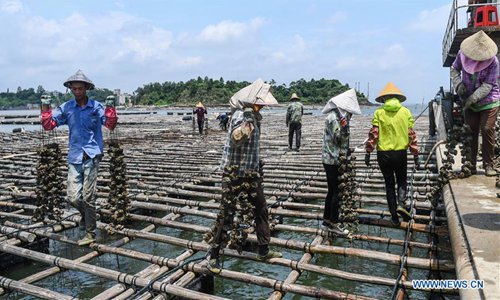
Farmers harvest oysters at the oyster cultivation fields in Qinzhou City, south China's Guangxi Zhuang Autonomous Region, July 20, 2019. China's agriculture sector has seen rapid growth over the past 70 years, with grain output expanding 4.8 times, according to a report from the National Bureau of Statistics (NBS). China's grain output grew at an average annual rate of 2.6 percent from 1949 to reach 658 billion kg in 2018, managing to feed around 20 percent of the world's population with only less than 9 percent of the world's arable land, according to the report. The country increased the diversity of food supply by developing the breeding industry, with the output of aquatic products ranking first in the world since 1989, which stood at 64.6 million tonnes in 2018, 143 times higher than 1949. The structure of the agriculture industry was continuously optimized, with a modern pattern promoting all-round development of farming, forestry, animal husbandry and fishery replacing the traditional farming pattern, the NBS said. Scale operation of agriculture was enhanced by the progress of rural land circulation. Over 35 million hectares of family contracted farmland was circulated in 2018, posing a sharp contrast to the 58 million mu in 2004. The country also fostered new types of entities of agricultural production and service. By the end of 2018, 600, 000 family farms and 2.17 million farmer cooperatives had been registered. (Xinhua/Zhang Ailin)
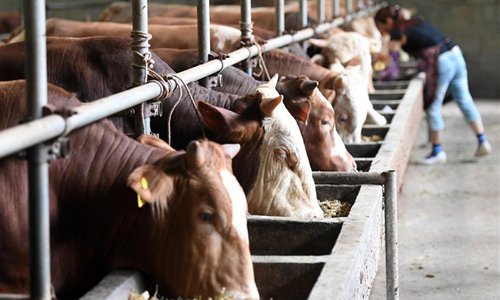
A farmer feeds cattle at a cooperative in Anning Village of Dongmiao Township in Du'an Yao Autonomous County, south China's Guangxi Zhuang Autonomous Region, July 24, 2019. China's agriculture sector has seen rapid growth over the past 70 years, with grain output expanding 4.8 times, according to a report from the National Bureau of Statistics (NBS). China's grain output grew at an average annual rate of 2.6 percent from 1949 to reach 658 billion kg in 2018, managing to feed around 20 percent of the world's population with only less than 9 percent of the world's arable land, according to the report. The country increased the diversity of food supply by developing the breeding industry, with the output of aquatic products ranking first in the world since 1989, which stood at 64.6 million tonnes in 2018, 143 times higher than 1949. The structure of the agriculture industry was continuously optimized, with a modern pattern promoting all-round development of farming, forestry, animal husbandry and fishery replacing the traditional farming pattern, the NBS said. Scale operation of agriculture was enhanced by the progress of rural land circulation. Over 35 million hectares of family contracted farmland was circulated in 2018, posing a sharp contrast to the 58 million mu in 2004. The country also fostered new types of entities of agricultural production and service. By the end of 2018, 600, 000 family farms and 2.17 million farmer cooperatives had been registered. (Xinhua/Lu Boan)
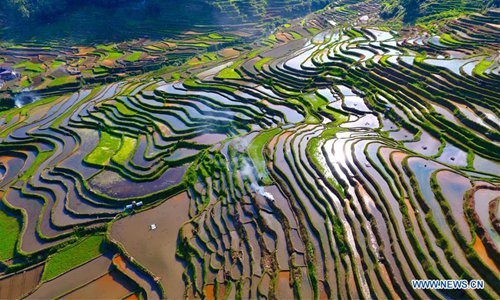
Aerial photo taken on May 23, 2019 shows terraced fields at Gandong Village of Rongshui Miao Autonomous County, south China's Guangxi Zhuang Autonomous Region. China's agriculture sector has seen rapid growth over the past 70 years, with grain output expanding 4.8 times, according to a report from the National Bureau of Statistics (NBS). China's grain output grew at an average annual rate of 2.6 percent from 1949 to reach 658 billion kg in 2018, managing to feed around 20 percent of the world's population with only less than 9 percent of the world's arable land, according to the report. The country increased the diversity of food supply by developing the breeding industry, with the output of aquatic products ranking first in the world since 1989, which stood at 64.6 million tonnes in 2018, 143 times higher than 1949. The structure of the agriculture industry was continuously optimized, with a modern pattern promoting all-round development of farming, forestry, animal husbandry and fishery replacing the traditional farming pattern, the NBS said. Scale operation of agriculture was enhanced by the progress of rural land circulation. Over 35 million hectares of family contracted farmland was circulated in 2018, posing a sharp contrast to the 58 million mu in 2004. The country also fostered new types of entities of agricultural production and service. By the end of 2018, 600, 000 family farms and 2.17 million farmer cooperatives had been registered. (Xinhua/Huang Xiaobang)

Liu Hebin (R) checks the newly harvested wheat grains at Gaocheng District of Shijiazhuang, north China's Hebei Province, June 10, 2019. China's agriculture sector has seen rapid growth over the past 70 years, with grain output expanding 4.8 times, according to a report from the National Bureau of Statistics (NBS). China's grain output grew at an average annual rate of 2.6 percent from 1949 to reach 658 billion kg in 2018, managing to feed around 20 percent of the world's population with only less than 9 percent of the world's arable land, according to the report. The country increased the diversity of food supply by developing the breeding industry, with the output of aquatic products ranking first in the world since 1989, which stood at 64.6 million tonnes in 2018, 143 times higher than 1949. The structure of the agriculture industry was continuously optimized, with a modern pattern promoting all-round development of farming, forestry, animal husbandry and fishery replacing the traditional farming pattern, the NBS said. Scale operation of agriculture was enhanced by the progress of rural land circulation. Over 35 million hectares of family contracted farmland was circulated in 2018, posing a sharp contrast to the 58 million mu in 2004. The country also fostered new types of entities of agricultural production and service. By the end of 2018, 600, 000 family farms and 2.17 million farmer cooperatives had been registered. (Xinhua/Zhang Xiaofeng)
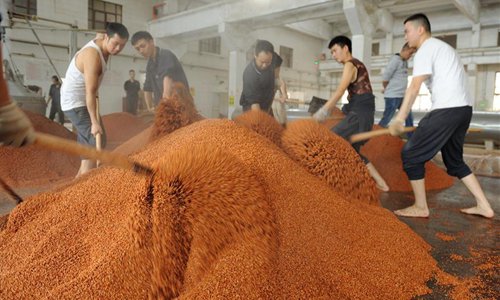
Workers process sorghum grains at a distillery of Kweichow Moutai in Maotai Township of Renhuai, southwest China's Guizhou Province, Oct. 23, 2018. China's agriculture sector has seen rapid growth over the past 70 years, with grain output expanding 4.8 times, according to a report from the National Bureau of Statistics (NBS). China's grain output grew at an average annual rate of 2.6 percent from 1949 to reach 658 billion kg in 2018, managing to feed around 20 percent of the world's population with only less than 9 percent of the world's arable land, according to the report. The country increased the diversity of food supply by developing the breeding industry, with the output of aquatic products ranking first in the world since 1989, which stood at 64.6 million tonnes in 2018, 143 times higher than 1949. The structure of the agriculture industry was continuously optimized, with a modern pattern promoting all-round development of farming, forestry, animal husbandry and fishery replacing the traditional farming pattern, the NBS said. Scale operation of agriculture was enhanced by the progress of rural land circulation. Over 35 million hectares of family contracted farmland was circulated in 2018, posing a sharp contrast to the 58 million mu in 2004. The country also fostered new types of entities of agricultural production and service. By the end of 2018, 600, 000 family farms and 2.17 million farmer cooperatives had been registered. (Xinhua/Yang Wenbin)
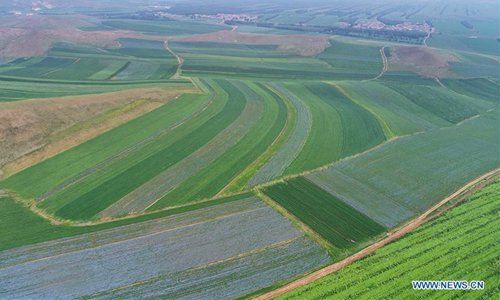
Aerial photo taken on July 28, 2019 shows farm fields in Saibei management district of Zhangjiakou, north China's Hebei Province. China's agriculture sector has seen rapid growth over the past 70 years, with grain output expanding 4.8 times, according to a report from the National Bureau of Statistics (NBS). China's grain output grew at an average annual rate of 2.6 percent from 1949 to reach 658 billion kg in 2018, managing to feed around 20 percent of the world's population with only less than 9 percent of the world's arable land, according to the report. The country increased the diversity of food supply by developing the breeding industry, with the output of aquatic products ranking first in the world since 1989, which stood at 64.6 million tonnes in 2018, 143 times higher than 1949. The structure of the agriculture industry was continuously optimized, with a modern pattern promoting all-round development of farming, forestry, animal husbandry and fishery replacing the traditional farming pattern, the NBS said. Scale operation of agriculture was enhanced by the progress of rural land circulation. Over 35 million hectares of family contracted farmland was circulated in 2018, posing a sharp contrast to the 58 million mu in 2004. The country also fostered new types of entities of agricultural production and service. By the end of 2018, 600, 000 family farms and 2.17 million farmer cooperatives had been registered. (Xinhua/Yang Shiyao)
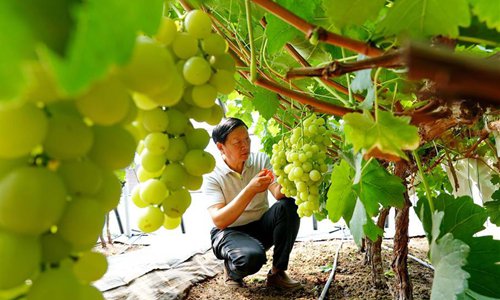
Zhao Shengjian, deputy director of Changli orchards research institute of Hebei Academy of Agriculture and Forestry Sciences, takes care of newly cultivated grapes at the breeding base of the institute in north China's Hebei Province, July 13, 2019. China's agriculture sector has seen rapid growth over the past 70 years, with grain output expanding 4.8 times, according to a report from the National Bureau of Statistics (NBS). China's grain output grew at an average annual rate of 2.6 percent from 1949 to reach 658 billion kg in 2018, managing to feed around 20 percent of the world's population with only less than 9 percent of the world's arable land, according to the report. The country increased the diversity of food supply by developing the breeding industry, with the output of aquatic products ranking first in the world since 1989, which stood at 64.6 million tonnes in 2018, 143 times higher than 1949. The structure of the agriculture industry was continuously optimized, with a modern pattern promoting all-round development of farming, forestry, animal husbandry and fishery replacing the traditional farming pattern, the NBS said. Scale operation of agriculture was enhanced by the progress of rural land circulation. Over 35 million hectares of family contracted farmland was circulated in 2018, posing a sharp contrast to the 58 million mu in 2004. The country also fostered new types of entities of agricultural production and service. By the end of 2018, 600, 000 family farms and 2.17 million farmer cooperatives had been registered. (Xinhua/Yang Shiyao)
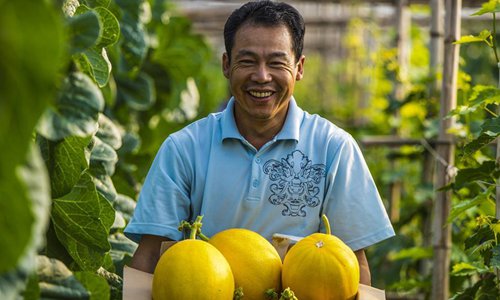
A farmer carries harvested muskmelons at Daboluo Village of Tanglin Township in Zaoqiang County, north China's Hebei Province, May 29, 2019. China's agriculture sector has seen rapid growth over the past 70 years, with grain output expanding 4.8 times, according to a report from the National Bureau of Statistics (NBS). China's grain output grew at an average annual rate of 2.6 percent from 1949 to reach 658 billion kg in 2018, managing to feed around 20 percent of the world's population with only less than 9 percent of the world's arable land, according to the report. The country increased the diversity of food supply by developing the breeding industry, with the output of aquatic products ranking first in the world since 1989, which stood at 64.6 million tonnes in 2018, 143 times higher than 1949. The structure of the agriculture industry was continuously optimized, with a modern pattern promoting all-round development of farming, forestry, animal husbandry and fishery replacing the traditional farming pattern, the NBS said. Scale operation of agriculture was enhanced by the progress of rural land circulation. Over 35 million hectares of family contracted farmland was circulated in 2018, posing a sharp contrast to the 58 million mu in 2004. The country also fostered new types of entities of agricultural production and service. By the end of 2018, 600, 000 family farms and 2.17 million farmer cooperatives had been registered. (Xinhua/Li Xiaoguo)

A herdswoman milks sheep in Rutog County of Ngari Prefecture, southwest China's Tibet Autonomous Region, Aug. 4, 2019. China's agriculture sector has seen rapid growth over the past 70 years, with grain output expanding 4.8 times, according to a report from the National Bureau of Statistics (NBS). China's grain output grew at an average annual rate of 2.6 percent from 1949 to reach 658 billion kg in 2018, managing to feed around 20 percent of the world's population with only less than 9 percent of the world's arable land, according to the report. The country increased the diversity of food supply by developing the breeding industry, with the output of aquatic products ranking first in the world since 1989, which stood at 64.6 million tonnes in 2018, 143 times higher than 1949. The structure of the agriculture industry was continuously optimized, with a modern pattern promoting all-round development of farming, forestry, animal husbandry and fishery replacing the traditional farming pattern, the NBS said. Scale operation of agriculture was enhanced by the progress of rural land circulation. Over 35 million hectares of family contracted farmland was circulated in 2018, posing a sharp contrast to the 58 million mu in 2004. The country also fostered new types of entities of agricultural production and service. By the end of 2018, 600, 000 family farms and 2.17 million farmer cooperatives had been registered. (Xinhua/Jigme Dorje)
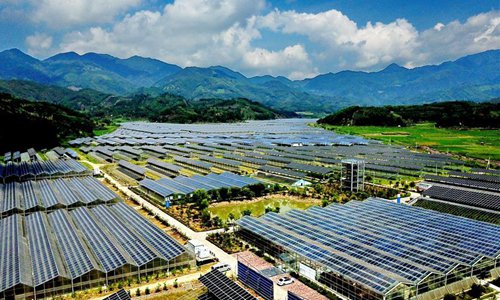
Aerial photo taken on July 28, 2019 shows the view of a photovoltaic power station as well as an agricultural garden in Dongping Township of Zhenghe County, southeast China's Fujian Province. China's agriculture sector has seen rapid growth over the past 70 years, with grain output expanding 4.8 times, according to a report from the National Bureau of Statistics (NBS). China's grain output grew at an average annual rate of 2.6 percent from 1949 to reach 658 billion kg in 2018, managing to feed around 20 percent of the world's population with only less than 9 percent of the world's arable land, according to the report. The country increased the diversity of food supply by developing the breeding industry, with the output of aquatic products ranking first in the world since 1989, which stood at 64.6 million tonnes in 2018, 143 times higher than 1949. The structure of the agriculture industry was continuously optimized, with a modern pattern promoting all-round development of farming, forestry, animal husbandry and fishery replacing the traditional farming pattern, the NBS said. Scale operation of agriculture was enhanced by the progress of rural land circulation. Over 35 million hectares of family contracted farmland was circulated in 2018, posing a sharp contrast to the 58 million mu in 2004. The country also fostered new types of entities of agricultural production and service. By the end of 2018, 600, 000 family farms and 2.17 million farmer cooperatives had been registered. (Xinhua/Zhang Guojun)
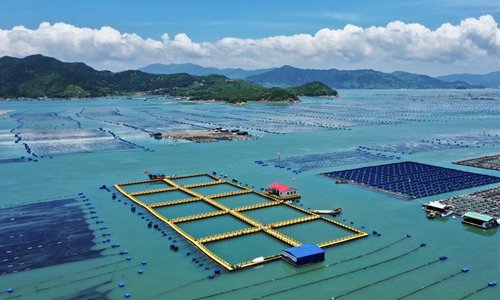
Aerial photo taken on July 17, 2019 shows fish breeding raft made of new materials in Xiahu Township of Xiapu County, southeast China's Fujian Province. China's agriculture sector has seen rapid growth over the past 70 years, with grain output expanding 4.8 times, according to a report from the National Bureau of Statistics (NBS). China's grain output grew at an average annual rate of 2.6 percent from 1949 to reach 658 billion kg in 2018, managing to feed around 20 percent of the world's population with only less than 9 percent of the world's arable land, according to the report. The country increased the diversity of food supply by developing the breeding industry, with the output of aquatic products ranking first in the world since 1989, which stood at 64.6 million tonnes in 2018, 143 times higher than 1949. The structure of the agriculture industry was continuously optimized, with a modern pattern promoting all-round development of farming, forestry, animal husbandry and fishery replacing the traditional farming pattern, the NBS said. Scale operation of agriculture was enhanced by the progress of rural land circulation. Over 35 million hectares of family contracted farmland was circulated in 2018, posing a sharp contrast to the 58 million mu in 2004. The country also fostered new types of entities of agricultural production and service. By the end of 2018, 600, 000 family farms and 2.17 million farmer cooperatives had been registered. (Xinhua/Jiang Kehong)